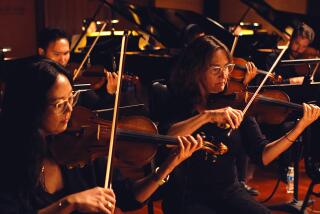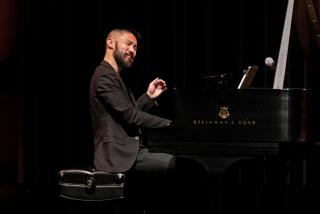Jack Elliott; Composer Led Mancini Institute
- Share via
Jack Elliott, arranger, composer and conductor for scores of hit television shows and movies, died Saturday of a brain tumor at UCLA Medical Center. He was 74.
The tumor was diagnosed just three weeks ago as Elliott worked as musical director of the Henry Mancini Institute, which brings gifted young musicians from throughout the world to Los Angeles for a summer training program, his son said.
For the record:
12:00 a.m. Aug. 22, 2001 FOR THE RECORD
Los Angeles Times Wednesday August 22, 2001 Home Edition Part A Part A Page 2 A2 Desk 1 inches; 33 words Type of Material: Correction
Jazz figures--The name of jazz drummer Shelly Manne was misspelled in Sunday’s obituary of composer Jack Elliott. Also Sunday, in the obituary of saxophonist Flip Phillips, the name of jazz impresario Norman Granz was misspelled.
Born Irwin Elliott Zucker in Hartford, Conn., Elliott graduated from the Hartt School of Music at the University of Hartford. He studied composition with Isadore Freed, Lukas Foss and Arnold Franchetti.
After completing his education, Elliott moved to New York, finding work as a jazz pianist at such rooms as the Stork Club. In the 1950s he lived in Paris, where he worked as an orchestrator and developed friendships with other expatriate musicians, including Quincy Jones.
Returning to New York, Elliott became a dance arranger and orchestrator for Broadway musicals, including “Fiorello” and “Tenderloin.”
In the early 1960s, he was lured to Los Angeles to work as a musical arranger on Judy Garland’s television show. He then worked as musical director for Andy Williams on his long-running NBC program. Elliott later produced and conducted the NBC television special “Live From Studio 8H: 100 Years of America’s Popular Music.”
For Elliott, work created more opportunities, and he fashioned a career as one of the top composers and arrangers in Hollywood.
Through the 1970s, if a show was popular on TV, it most likely had the music of Elliott and his frequent collaborator Allyn Ferguson. Those shows included “Police Story,” “Barney Miller,” “Starsky and Hutch,” “Charlie’s Angels” and “The Love Boat.”
Elliott also worked in films, often with director Carl Reiner, on projects including “The Comic,” “Where’s Poppa?” “The Jerk” and “Oh God.”
He became the musical director of choice for big event telecasts, working on several Academy Award shows, Emmy Award shows and Kennedy Center Honors. He was the only director of the Grammy Award orchestra in its 31-year history.
In 1984, he served as music director for the Summer Olympics in Los Angeles, writing music for the opening and closing ceremonies as well as conducting the orchestra.
In the late 1970s, Elliott cut back on his lucrative television work to help found the New American Orchestra, which commissioned and performed new compositions, mainly from American jazz composers.
With a base in Los Angeles and performances at the Music Center, the orchestra included some of the top studio musicians in town and noted guests such as Gerry Mulligan, the Modern Jazz Quartet, Shelley Manne, Sarah Vaughan and Phil Woods.
The orchestra presented inventive programming well into the 1990s. But though the music was critically well received, the orchestra had trouble finding an audience and the money to pay for its creative endeavors.
“It’s absolutely crazy,” Elliott once lamented in an interview. “We’ve presented important works that have never been heard before, and who knows when they can be heard again? It’s a crime that this orchestra is not recorded.”
In 1993, the orchestra--under its new name, the American Jazz Philharmonic--did record a compact disc on the GRP label that was nominated for a Grammy.
Some of Elliott’s most important work came during the last five years through the American Jazz Philharmonic’s association with the Henry Mancini Institute. Named for the legendary film composer, the institute offers a monthlong program of concerts, seminars and master classes.
Aware of the value of versatility in his career, Elliott shaped a program that reflected his far-ranging skills, insisting that each of the players, regardless of their backgrounds, experience film music, jazz, improvisation, contemporary and classical music in large and small ensembles.
“There isn’t anything else around quite like this,” Elliott said of the program last year in an interview with Don Heckman, who writes about jazz for The Times. “They’re playing music that just doesn’t exist in this form in many places. . . . And many of them show up unprepared for the shock of playing this range of music. It’s totally unique.”
In lieu of flowers, the family requests that donations be made to the Henry Mancini Institute, P.O. Box 34575, Los Angeles, CA 90034-0575.
Funeral arrangements are pending and will be announced.
More to Read
The biggest entertainment stories
Get our big stories about Hollywood, film, television, music, arts, culture and more right in your inbox as soon as they publish.
You may occasionally receive promotional content from the Los Angeles Times.










